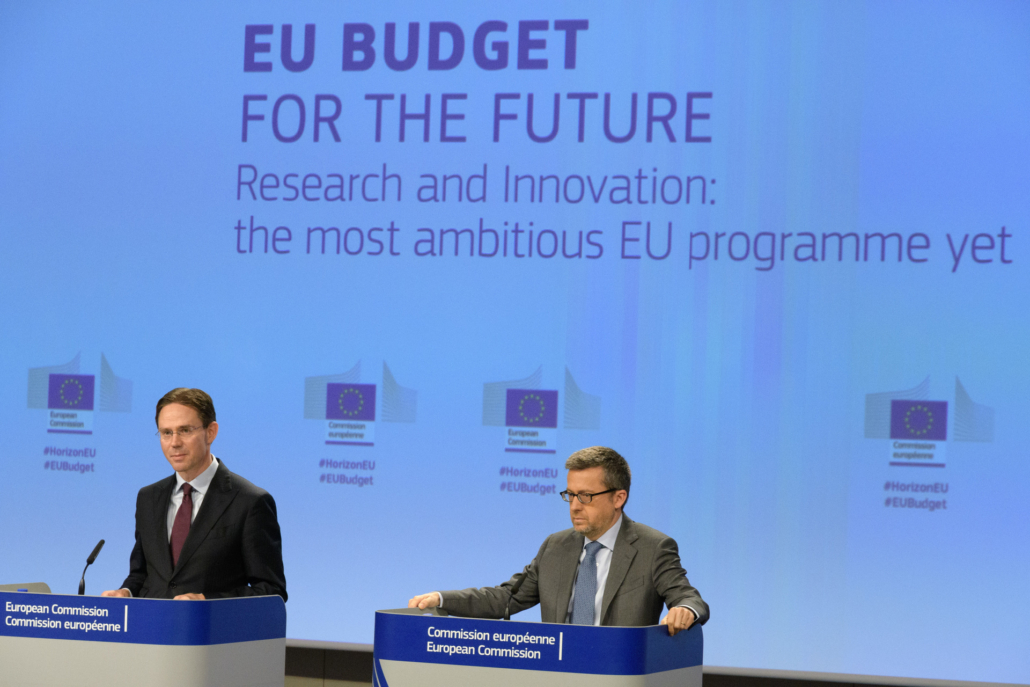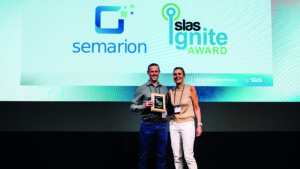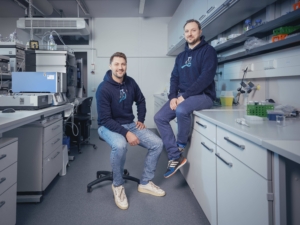
EC earmarks €100bn for Horizon Europe
EU Commissioners Jyrki Katainen and Carlos Moedas proposed a budget increase of 25% for the next European Research and Innovation programme Horizon Europe (2021-27) vs Horizon 2020. However MEPs said that the new moonshot research section EIC is underfunded. Furthermore, the current funding quote of 11% was too low compared to other international excellence programmes.
While the European Commission proposed Horizon Europe to have a budget of €97.6bn, a High Level Group report published last July recommended a budget of at least €120bn. However, as previous programmes had budgets of €50.5bn (FP7) and €74.9bn, respectively, the level appears appropriate on first sight. Christian Ehler and Dan Nica, the MEPs that will steer the programme, Horizon Europe through the European Parliament, however, said they want to convince the European Council to vote for the €120bn budget. Ehler said the budget proposed by the European Commission does not live up to the ambitions put forward by European leaders and research and innovation stakeholders, for Europe to meet global challenges.
Horizon Europe is built on three thematic pillars and will be complemented by InvestEU, an €15.2bn investment support programme aimed at speeding up product development from R&D. The EC expects its elements to mobilise further investments of €650bn.
The Open Science pillar earmarks €25.8bn for basic research – €16.6 bn for the European Research Council ERC, €6.8bn for Marie Sklodowska-Curie Actions and €2.4bn for research infrastructures.
The Global challenges pillar is designed to support research relating to societal challenges. Its five missions will get the biggest slice of the pie – €52.7bn are earmarked to address global challenges and industrial competitiveness. The health mission will bag €7.7bn; inclusive and secure societies, €8bn; digital and industry, €10bn; climate, energy and mobility, €15bn; and food and natural resources, €10bn.
The €13.5bn Open Innovation pillar aims to make Europe a front runner in market-creating innovation. The EC has earmarked €10.5bn for a new European Innovation Council (EIC), a one-stop shop for high potential and breakthrough technologies and innovative companies with potential for scaling up inspired from the successful example of DARPA, the US agency responsible for ground-breaking innovations such as the Internet, the GPS and stealth technology. The EIC will allocate its budget to high risk moonshot research. The new focus won’t get on cost of the European Institute of Technology (EIT), which has a similar focus and will receive €3bn after €2.7bn in Horizon 2020. Researchers report that the 11% average funding rate within Horizon 2020 and the administrative burden, which is often outsourced to professional consultants, could deter research groups from applications. However, success rates have been higher across certain sections of the programme.
Adiitionally, the Commissions JRC stands to get €2.2 bn through fellowships and exchanges as well as funding to projects driven by researchers themselves, through the European Research Council and the Marie-Sk?odowska-Curie actions.
While the UK was FP7’s biggest beneficiary with tax contributions of only €5.4bn but FP7 funding of €8.7bn it will be biggest looser in Horizon Europe because of the BREXIT. Observers said they expect the UK to get less support than other associated nations such das Israel or Ukraine.
Commission Vice-President Jyrki Katainen, responsible for Jobs, Growth, Investment and Competitiveness, said Investing in research and innovation is investing in Europe’s future. EU funding has allowed teams across countries and scientific disciplines to work together and make unthinkable discoveries, making Europe a world-class leader in research and innovation. With Horizon Europe, we want to build on this success and continue to make a real difference in the lives of citizens and society as a whole.
Carlos Moedas, Commissioner for Research, Science and Innovation, added: "Horizon 2020 is one of Europe’s biggest success stories. The new Horizon Europe programme aims even higher. As part of this, we want to increase funding for the European Research Council to strengthen the EU’s global scientific leadership, and reengage citizens by setting ambitious new missions for EU research. We are also proposing a new European Innovation Council to modernise funding for ground-breaking innovation in Europe".


 SLAS - Alexandra Csuport Photography
SLAS - Alexandra Csuport Photography Phabioc GmbH
Phabioc GmbH